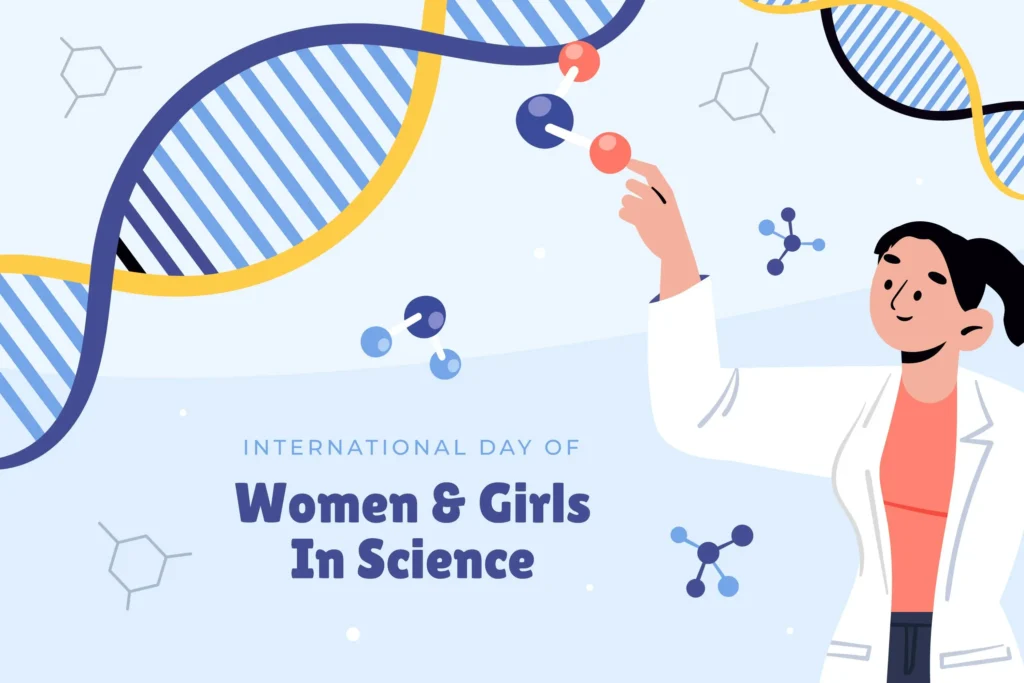This year, in 2025, the United Nations is commemorating the International Day of Women and Girls in Science’s tenth anniversary. In 2015, around a decade ago, the United Nations announced that February 11 will be recognised as an International Day of Women and Girls in Science.
By commemorating this day, the United Nations hopes to close the gender gap in science. On this day, various programs are held all around the world to commemorate the role of women in scientific development and progress. The primary goal is to encourage girls and women to pursue more scientific and technological courses and play their appropriate roles in light of the world population’s size.
What is the meaning of International Day of Women and Girls in Science?
Science is absolutely necessary for progress and development. Scientific development has given us numerous opportunities. However, these advantages are limited to specific geographic zones. Women have also lagged behind in science.
Despite international efforts, barely one-third of scientists are women. It is critical to close this gender gap since it stifles economic growth in many countries. The UN considers this a global concern, as no single country or group can change the situation.
This is why UNESCO is launching an international effort to generate political will for this issue. It is critical to unite governments, advocacy groups, and other stakeholders under a single platform. To attain this goal, UNESCO is coordinating a global effort. The UN is focussing on three action areas:
- Dismantling gender stereotypes and prejudices in science.
- Creating educational opportunities for girls in science.
- Creating workplace settings that support and advance women scientists.
These efforts include recognising female scientists’ contributions on a worldwide scale through media coverage and textbooks. To expand research grant opportunities for women and to promote initiatives aimed at reducing gender bias and stereotypes.
It is equally critical to promote equitable remuneration for female scientists. Long-term employment contracts for women are also important so that they have more options for family planning. Many governments are also attempting to promote work-life balance for female scientists, allowing them to do research for extended periods of time.
According to the United Nations, while more women are pursuing higher education in recent years, their representation in science, technology, engineering, and mathematics (STEM) subjects remains low in comparison to men.

Why does the UN observe these days?
The UN observes these days, which raises the question of why. It is worth noting that the tradition of observing international days predates the United Nations. This indicates that the United Nations has just adopted it because it believes it is a valuable tool for promoting causes and fostering global consensus.
On such days, the global media takes up and discusses these concerns. Newspapers produce special news features and pieces, which help raise awareness. Every year brings some success. Many of these UN observances are crucial for raising awareness of diseases that the majority of people are unaware about.
Each special day also presents a new opportunity for the UN to pressure states to act. Civil society and advocacy groups also contribute to the well-being of vulnerable communities. In all of these circumstances, the UN observation of a certain day has a significant impact on the world stage.

How will it benefit the world?
Women account up half of the global population. They also represent half of the worldwide potential. Countries with more gender equality perform far better than those with inferior possibilities for women. This is because research shows that more female labor-force participation improves economic growth and prosperity.
It is particularly critical to promote women and girls in science, as many talented women are denied chances. The lack of possibilities for these girls and women leads to lost scientific potential and progress for the entire planet.
The more girls that pursue careers in science and technology, the more scientific output we will receive from the global scientific community. Despite tremendous achievement, millions of young girls do not receive an education, let alone a quality scientific education. A large portion of scientific production is at stake if young girls do not receive scientific education.
Conclusion
Science education has transformed our life. Scientific knowledge has had a huge impact on our lives, from improved health care to overall wealth. By increasing scientific education, the globe can generate more scientists, particularly those who demand a little assistance to outperform others. By supporting Women and Girls in Science, we ensure a more inclusive world will benefit everyone, not just women.
Join ABM College’s Medical Office Assistant Diploma
If you are interested in joining the healthcare industry in Canada, then you should join ABM College’s diploma in Medical Office Assistant. It prepares students to work and excel in different medical care environments. This diploma is designed to provide a balanced combination of theory and practical skills to the students so that they can excel in their careers. This program also has a practicum component so that students have the opportunity to start their careers right after graduation. Contact us to get more information about this program.
Read more industry-related blogs here.
Pictures by Freepik
About The Author

Content Writer
Farhan Zaheer is a Content Writer at ABM College. He holds a Master’s degree from Heidelberg University in Political Science. He also holds a Master’s degree in Mass Communication; and has been working with newspapers for over 10 years.
